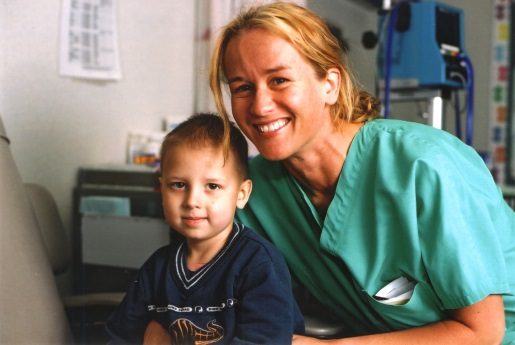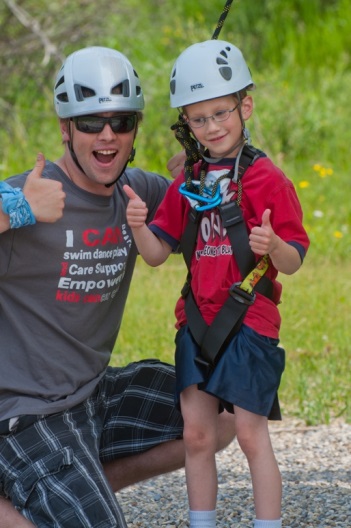I started working in the field of pediatric oncology in 1998. As a University of Calgary nursing student, I did my 4th year senior rotation at the old Alberta Children’s Hospital on Q Cluster. I’ll never forget my first shift there. It was a night shift and I had never seen such sick children. I couldn’t imagine ever becoming comfortable, let alone proficient, with the nursing care they required, nor could I imagine how I could be of any help to the families. But I knew I was home. I knew, somehow, this was my life’s work.
It’s funny, the memories that stick with you through the years. I don’t know why so many of my most vivid memories come from the night shifts. Bringing a cup of tea to the mother of a newly diagnosed child, who left the room, so her child wouldn’t see her fear, her tears; long conversations about the “whys” of cancer – “Why me? Why my child?”; listening to the teenager, who couldn’t sleep at night, talk about his video game and, every so often, as if almost by mistake, his fears about his future.
Most of these questions, I learned, were unanswerable. The point was to listen, to be there, to not be afraid of the sadness and the unanswerable questions. To show up in the face of something terrifying and somehow try to convey to these kids and parents a feeling of peace.

Over the course of several years, I worked my way through many of the positions in the oncology program. From staff nurse, to clinic nurse, to research nurse, and then eventually into administration. I used to joke that if you stay put long enough they’ll eventually let you run the place! My many positions and titles within the pediatric oncology program gave me a lot of insight into how the world of pediatric oncology worked and how I could best fit within it.
In 2006, we moved to the new ACH and that quickly became home for patients, families and staff. Our new building was luxurious and world class, but part of me always longed for the comfort and coziness of the old hospital. My roots were there.

When it was time to return from my maternity leave in 2010, with much thought and a somewhat heavy heart, I decided to return to the University of Calgary to pursue a PhD. In 2013, I started as an assistant professor in the Faculty of Nursing at the University of Calgary, and I have had the privilege to focus my research program in the field of pediatric oncology.
I like to say I still work in the field of peds onc, just in a different way. Just like the memories I described, I’ve always been most drawn to understand experiences. How do kids and families get through this? What is the experience like? What can we do to make it a bit easier? I like to say I’m interested in the “Whys and Hows” of pediatric oncology. In academic terms, what I do is called psychosocial research. I like to look at ways to make the experience of childhood cancer easier.
 For my PhD work, I studied the impact of cancer camp and found that it has profound healing effects on both children and parents. Now,
For my PhD work, I studied the impact of cancer camp and found that it has profound healing effects on both children and parents. Now,
I’m studying the impact of digital storytelling on patients and survivors as way to further understand the experience of childhood cancer and as a way to teach health care professionals more about the experience, in ways they couldn’t have previously understood.
One child’s digital story hit the Twittersphere last fall and took off. This little guy has dreams of playing hockey professionally and one day meeting Sidney Crosby, so when the Pittsburgh Penguins heard about it, they made one of his dreams come true. He met Sidney after a game in Calgary last fall.
One of the courses I teach in my role as an assistant professor is a 4th year undergraduate oncology course. I vehemently strive to impress upon students that the physical care is actually the easy part; it’s the psychosocial care that’s harder. They laugh at me, a bit nervously, when I tell them to trust me, that they’ll never go home and say, ‘I gave the hell out of those platelets today!’ So in my course, I try to spend as much time on the psychosocial needs and care that come with childhood cancer as I do with the pathophysiology and pharmacology parts, because quite honestly, we’re not where we need to be with respect to understanding, let alone addressing, the psychosocial needs of these kids and families. I’ve learned through my research that it sometimes takes decades for the psychological scars to show. The impact on these children later in life can be unfathomable. I want to work to change that.
— Dr. Catherine Laing, PhD., Assistant Professor, Faculty of Nursing, University of Calgary














